
Authors:
Zykas, Aurelijus
Published on:
2014
Publisher:
Aukso Pieva
Aurelijus Zykas in his book ‘The colors and flavors of Japan’ introduces the reader with this distant country. The author, basing the narrative on his own personal experience, tells the reader about his life in Japan, spent living in two very different cities – Tokyo and Kanazawa. The book is split in two parts – the first part tells mostly about the years spent studying in Kanazawa. The second part concentrates on the life in Tokyo, while studying in Waseda University and working in the Embassy of the Republic of Lithuania in Tokyo few years later. This books is a perfect choice for anybody who is interested in Japan and its culture. More
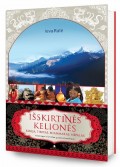
Authors:
Rute, Ieva
Published on:
2014
Publisher:
Aukso pieva
Ievos Rutes book can be considered as responsible travelling and astonishing travelling routes guide. As it can be guessed from the name of the book author talks about sightseeing in China, Tibet, Mianmar and Nepal. As we all know these exotic countries have a lot to offer in many different aspects such as culture, architecture, art. As author herself says: “I never go on a trip without my camera equipment” and that is why this book attracts even more attention with all the amazing photographies it has from the smallest temples to worlds highest mountains. That is why after reading this book the desire to travel is over the top. More
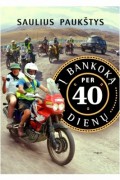
Authors:
Paukštys, Saulius
Published on:
2014
Publisher:
Tyto alba
“Į Bankoką per 40 dienų”, the book written by Photo-artist Saulius Paukštys, describes a breathtaking story and memories. The journey was organized in order to commemorate the eightieth anniversary of the fearless Transatlantic flight of two legendary Lithuanian pilots – Steponas Darius and Stasys Girėnas. During the trek lasting for almost two months, the distance exceeding fourteen thousand kilometers was covered by two motorcyclists accompanied by their two friends driving cars. A variety of roads and paths, from coasting on asphalt roads to adventures off the beaten track, nearly everything was tried out on their way to Thailand crossing Latvia, Russia, Kazakhstan and Laos. More
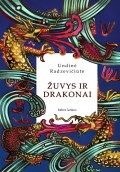
Authors:
Radzevičiūtė, Undinė
Published on:
2013
Publisher:
Baltos lankos
The “Fishes and Dragons“ book is different from the traditional Lithuanian literature tradition. It is like different category, in which intellectual challenge is combined with refined and not refined humor, and characters talks as they were fighting with a swards. According to Saulius Repečka – redactor of “Baltos Lankos” publishing house, this book is for reader, who can separate event of literature from the literature bubble. The name of the book “Fishes and Dragons” symbolizes Christianity, symbol of Christ – fish, and the power of imperator of China – dragon. Therefore conjunction of these two different worlds. More
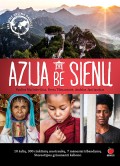
Authors:
Mačiulevičius, Paulius, Tilmantaitė, Berta, Jančiauskas, Andrius
Published on:
(Lietuvių) 2013
Publisher:
(Lietuvių) Obuolys
Pack your rucksack, quit your job, leave your family and friends for who knows how long and buy one way ticket to a place, you have never been to. Sounds hard isn‘t it? However, three travelers from Lithuania: journalist Paulius Mačiulevičius, photographer Berta Tilmantaitė and psychologist Andrius Jančiauskas proves that there are no limits and everything is possible. Three authors’ book “Asia without borders” retold seven month long trip through ten Asian countries. With the idea “The globe is friendly” travelers decide to meet such a chaotic and in the same time very colourful Asian culture. More

Authors:
Kyoko Koma
Published on:
2012
This book "Fashion and intercultural stereotypes. The case of the articles on Japanese couturiers in Le Figaro and Libération" presents how French newspapers represent Japanese fashion designers who create “Japanese phenomenon” in Prêt-a-porter of Paris in 1980s and their works, through the discourse analysis of French School. The author analyses how two French representative national newspapers Le Figaro and Libération, which are oppositely politicized, represent the Japanese fashion creators and their works, by means of stereotypes on Japan classified by French linguist Jean-Paul Honoré into 8 points: puissance, order, mystery, refinement, rigueur, pragmatism, past and modernity. More

Published on:
2012
Publisher:
Vytautas Magnus University
The volume presents a collection of articles and materials from international symposium “Japanology within Asian Studies in Lithuania: Historical Perspective and Present Situation” held on 3-4th of November in 2011 on the occasion of the 10th aniversary of Vytautas Magnus University Centre for Asian Studies. The articles of this volume present the development of East Asian (Japanese, Chinese and Korean) studies in Lithuania, with a special emphasis paid to Japanese studies. Sponsored by Japan Foundation
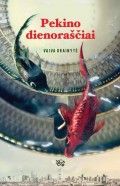
Authors:
Grainytė, Vaiva
Published on:
(Lietuvių) 2012
Publisher:
Vaga
Poet, prose miniatures and essays author Vaiva Grainytė as many students has experienced what it feels to study abroad. By choosing Beijing\’s Central Academy of Drama the writer hoped next to the language studies get known to the local scene arts, to learn more about the Asian theater.
To More

Authors:
Dalia Švambarytė
Published on:
2011
The monograph compares the links between medieval Japanese and Chinese literature. The text answers the question of how Japanese integrity of perceiving the world andthe vitality of Japanese speech was preserved under the conditions of the dynamic interaction of texts.

Authors:
Repečkaitė, Daiva
Published on:
2011
Throughout the history of its representation in the European and North American eyes, China has been viewed as unique, but at the same time placing it on a politico-cultural grid was perceived as a necessity to make theories and discourses work. After a brief period of positioning China in post-socialist transition, its place in representation changed to an exploitative pool of cheap labour and then – to an emerging superpower. Therefore China is as much a testing ground for theories about the development of capitalism and world political systems as it was in the 19th century. The empirical part of this publication discusses how cultural theories, symbols and images powerfully shape the discourse around China in rationalist, economically oriented elite media, and then discusses the role of experts, who position themselves as intermediaries, fluctuating in the field of the rules of various genres of knowledge production. Based on media discourse analysis and interviews with the experts, the author shows how different methods of knowledge production and claim-making interact in shaping political positions at the EU level.










